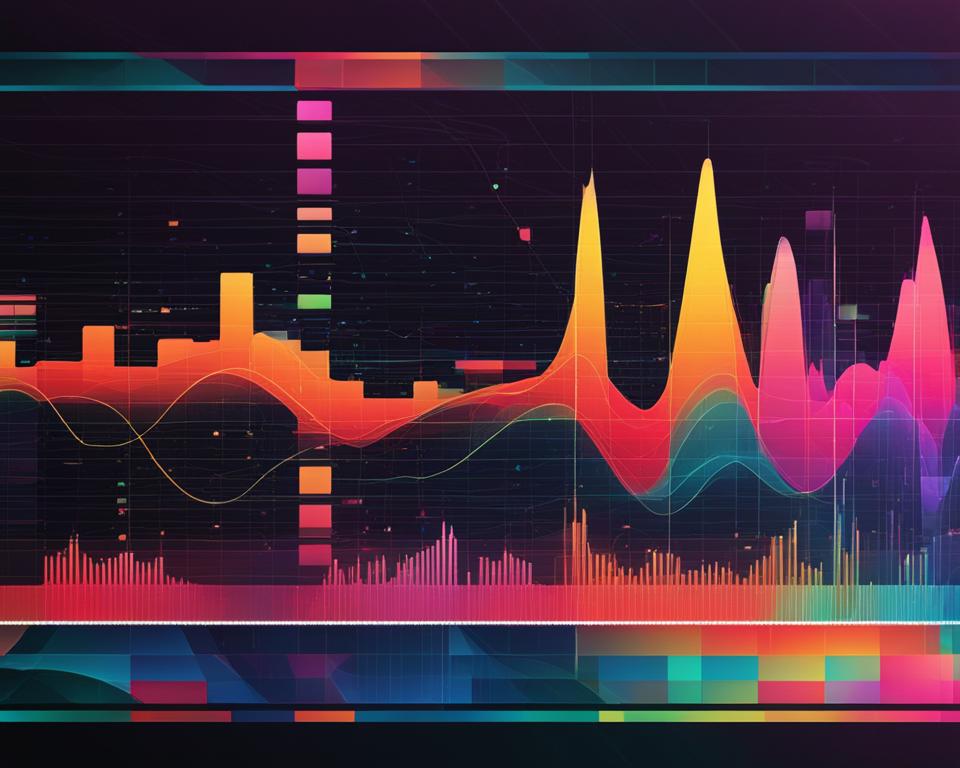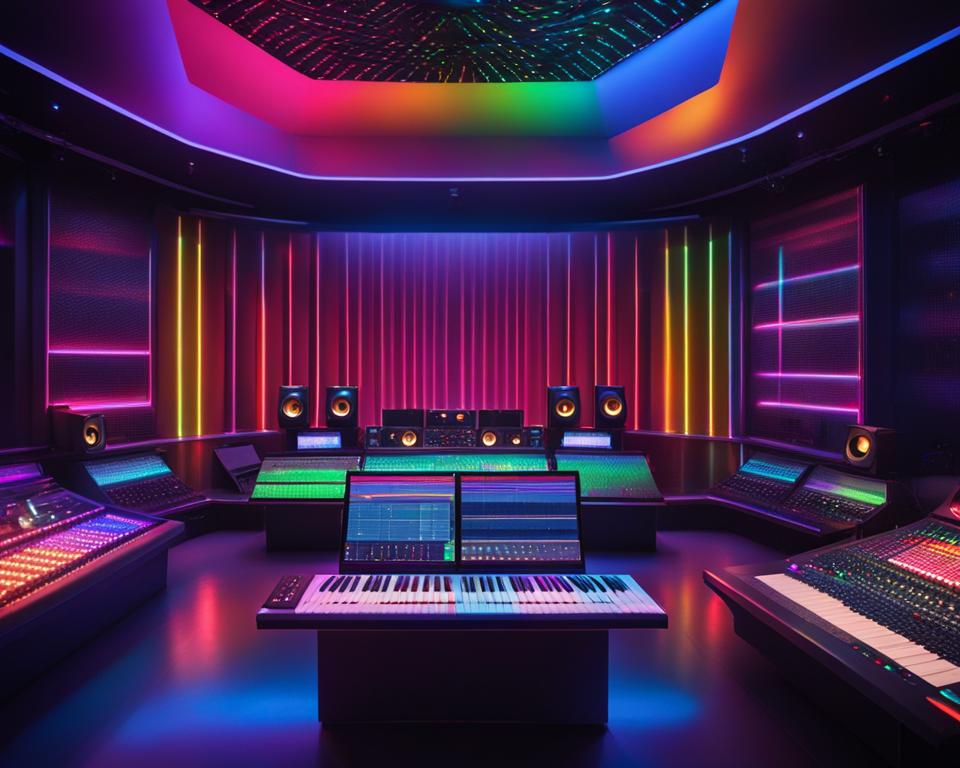As a copywriter journalist, I have been researching the latest trends in music creation and production. One technology that has been gaining a lot of attention is AI music analysis. With the help of artificial intelligence, machine learning, and music processing algorithms, music data analysis has become more powerful than ever before.
This in-depth exploration of AI in music will reveal how it is revolutionizing the industry from every angle. From enhancing music compositions to improving the recommendation systems, AI technology is changing the way we consume and interact with music. Join me as I dive deeper into the world of AI music analysis and uncover its potential impact on the future of sound.
Evolution of AI in Music Creation and Production
Since its inception, AI has had a profound impact on music creation and production, ushering in a new era of innovation and creativity. The earliest forms of AI in music analysis involved the use of simple algorithms to generate basic compositions. However, with the development of more sophisticated music processing algorithms, AI has become a powerful tool for enhancing and revolutionizing music production.
Early AI music analysis was limited in scope and relied heavily on manual input for generating compositions. However, over time, machine learning techniques have enabled AI to analyze vast amounts of music data and create compositions that are more complex and nuanced than ever before. By recognizing patterns and understanding the context of music, AI algorithms have become capable of generating compositions that are almost indistinguishable from those created by human musicians.
Today, AI is increasingly being used in music production and post-production, with software and tools that leverage the power of AI for tasks such as auto-tuning and beat matching. AI-driven music analytics tools are also being used to achieve more precise and accurate music analytics, enabling artists and producers to make more informed decisions about their creative output.
As AI continues to evolve and become more sophisticated, it has the potential to transform the way we create, produce and consume music. AI-driven tools such as music analytics, composition and production software are increasingly being integrated into every stage of the music production process and the impact is already being felt across the industry.
The Power of AI Algorithms in Music Composition
Artificial intelligence music analysis is taking the world of music composition to new heights. With the help of machine learning music analysis, composers can push the boundaries of creativity and generate compositions that were previously unimaginable.
By employing advanced algorithms to analyze vast amounts of music data, AI-driven music composition tools can learn from existing music and generate new, original pieces. These compositions can range from simple melodies to complex harmonies that challenge the norms of traditional music.
Additionally, AI-powered music composition can help music producers overcome creative blocks and provide inspiration when needed the most. Music composers and producers can use artificial intelligence music analysis software to experiment with different sounds, tempos, and rhythms, giving them the freedom to explore new avenues of artistic expression.
“With the help of AI algorithms, I was able to create compositions that would have taken me weeks to come up with. It has taken my music to the next level, and I cannot imagine working without it.”
As AI-driven music composition continues to evolve, it has the potential to revolutionize the music industry, paving the way for new forms of music creation and production.
The Benefits of AI in Music Composition
| Benefit | Description |
|---|---|
| Efficiency | AI algorithms can compose music at a faster pace than humans, saving time and increasing productivity |
| Creativity | AI-powered music composition tools can help artists and producers generate unique compositions that challenge traditional norms. |
| Inspiration | Artificial intelligence music analysis software can provide inspiration to composers when they are feeling uninspired or stuck. |
| Versatility | AI-powered music composition can be used for different genres of music, broadening the scope of what is possible. |
Overall, the power of AI algorithms in music composition is undeniable. As technology continues to evolve, we can expect to witness even more significant advancements that will transform the way we think about music creation and production.
Enhancing Music with AI: The Impact on Artists and the Industry
AI has increasingly become a game-changer in the music industry, and it is empowering artists and producers to create music that pushes the boundaries of creativity. With the aid of AI music analysis tools, musicians can now streamline the production process by harnessing the power of data analysis and music analytics.
One area where AI has proved particularly useful is in the enhancement of vocals and instrumentation. Through the use of music analysis software and tools, producers can identify areas that require improvement and adjust levels and ratios to improve the sound quality.
Another significant impact of AI in music is the generation of new ideas and styles. With machine-learning algorithms, AI-powered music composition software can identify patterns and generate new music styles that cater to a broader audience.
Furthermore, AI is enabling the industry to explore new avenues of music creation by combining synthesis and sampling technologies. For instance, with the use of generative adversarial networks (GANs), AI is now capable of generating unique and innovative sounds that are not achievable through traditional music production techniques.
Music performance is also benefiting from AI analysis and enhancement tools, allowing live performances to become more immersive and interactive. AI-generated visual displays, synchronized stage lighting, and sound effects help create a more captivating visual and auditory experience for audiences.
As the music industry continues to evolve, modern producers are leveraging AI processing algorithms to achieve a competitive edge. The ability to enhance music quality, generate new ideas, and streamline the production process is transforming the industry and empowering artists to experiment with new music styles and techniques.
AI-Driven Music Analysis: Unleashing the Future Potential
As AI continues to advance, it unlocks new possibilities for music analysis unlike anything we’ve seen before. Through AI music analysis, we can gain a deeper understanding of sound and find new insights that were previously hidden. For instance, AI can help us extract valuable data from music that can be used to enhance recommendation systems and create more personalized music experiences.
The potential for AI music analysis is vast. We can use it to identify patterns and trends in music data, and create new ways of categorizing and organizing music. With the help of music processing algorithms, we can enhance the quality of music by improving the sound quality, identifying areas for improvement, and even creating new compositions.
“Through AI music analysis, we can gain a deeper understanding of sound and find new insights that were previously hidden.”
Overall, AI-driven music analysis presents a wide range of possibilities that can revolutionize the way we consume, create, and interact with music. By harnessing the power of advanced algorithms and software, we can unlock new insights and find exciting ways to enhance the music experience for everyone involved.
Music Analysis Software and Tools: Harnessing the Power of AI
Music analysis software and tools are essential in leveraging the power of AI music analysis. These tools enable musicians and producers to unlock new creative possibilities and streamline their workflow with the help of AI-driven technologies. Let’s take a closer look at some of the most popular music analysis software and tools.
| Software/Tool Name | Features | Benefits |
|---|---|---|
| LANDR | Automated mastering, intelligent distribution, and promotion tools | Saves time and effort, enhances sound quality, maximizes reach and engagement |
| Amper Music | AI-driven music composition and production, customizable genre, and mood options | Facilitates music production, empowers creativity and experimentation, enhanced control over the final output |
| Splice | Cloud-based music production platform, collaboration tools, and access to over 2 million sounds | Simple and intuitive workflow, harnesses the latest production trends, provides a vast library of high-quality sounds and samples |
These music analysis software and tools use machine learning algorithms to analyze music data, generate new compositions, and enhance its quality. They offer musicians and producers greater control over the production process, allowing them to focus more on creativity and experimentation while minimizing repetitive and time-consuming tasks.
The Future of Sound: Embracing AI in Music
I firmly believe that the future of sound lies in embracing AI in music. Artificial intelligence has the potential to revolutionize music creation and production, and we are only scratching the surface of what is possible. With the ever-expanding capabilities of AI music analysis, we can expect to see a host of advancements and innovations in the world of music.
One of the most exciting applications of AI in music is its ability to enhance the listening experience. By analyzing vast amounts of music data, AI algorithms can generate highly accurate and personalized music recommendations, improving the way we discover, consume, and interact with music. Additionally, AI-driven music analysis can help identify patterns and trends in music consumption, leading to a deeper understanding of listener preferences and behavior.
Furthermore, AI-powered tools and technologies can empower musicians and producers to experiment with new sounds and styles, unlocking new avenues for artistic expression. With the help of music analytics and processing algorithms, they can streamline the production process, identify areas for improvement, and generate new compositions that push the boundaries of creativity and innovation.
Of course, with any new technology, there are concerns and ethical considerations that must be addressed. As AI continues to shape the future of music, we must ensure that it is used responsibly and ethically, taking into account issues such as copyright infringement and bias in music recommendations.
In conclusion, the future of sound is bright, and AI is poised to play a significant role in shaping it. From enhancing the listening experience to empowering artists and producers, the possibilities of AI music analysis are endless. By embracing AI in music, we can usher in an era of unprecedented creativity, innovation, and musical excellence.




